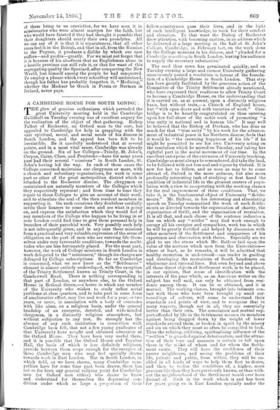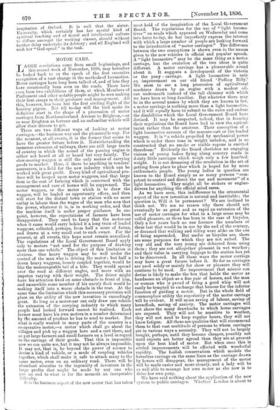A CAMBRIDGE HOUSE FOR SOUTH LONDO:. - . T HE glow of genuine
enthusiasm which pervaded the great University meeting held in the Cambridge Guildhall on Tuesday evening was of excellent augury for the realisation of the object of that gathering. Bishop Talbot of Rochester, an Oxford man to the core, has appealed to Cambridge for help in grappling with the vast spiritual, moral, and social needs of his diocese in South London, and the appeal has been felt to be irresistible. Be it carefully understood that at several points, and in a most vital sense, Cambridge was already on the ground. Six of her Colleges—Trinity, St. John's, Corpus Caine, Clare, and Pembroke—have for some years past had their several " missions " in South London, St. John's having led the way. In each of these cases the College concerned maintains one clergyman or more, with a church and subsidiary organisations, for work in some part or other of the great metropolitan district which is attached to the Rochester diocese. The clergymen so maintained are naturally members of the Colleges which they respectively represent; and from time to time they repair to those Colleges to give an account of their work, and to stimulate the zeal of the then resident members in supporting it. On such occasions they doubtless cordially invite their hearers to come down and see what is going on, and express the satisfaction which they would feel if any members of the College who happen to be living in or near London could find time to give them personal help in branches of their parochial work. Very possibly such help is not infrequently given, and in any case these missions form a practical and very valuable expression of the sense of obligation on the part of men who are entering life them- selves under very favourable conditions, towards the multi- tudes who are less fortunately placed. For the most part, however, the work of College missions in South London is work delegated to the " missioners," though its charges are defrayed by College subscriptions. So far as Cambridge is concerned, what we now know as the " Settlement " element is almost entirely undeveloped, with the exception of the Trinity Settlement known as Trinity Court, in the Camberwell Road. There is nothing corresponding in that part of London, or anywhere else, to the Oxford House in Bethnal Green,—a house in which any member of the University who wishes to study urban social problems at close quarters, and to take part in some form of ameliorative effort, may live and work for a year, or two years, or more, in association with a body of comrades with like aims, on a religious basis, under the general headship of an energetic, devoted, and wide-minded clergyman, in a distinctly religious atmosphere, but without subjection to any test. So strongly has the absence of any such institution in connection with Cambridge been felt, that not a few young graduates of that University have sought and obtained admission at the Oxford House. They have been very useful there, and it is possible that the Oxford House and Toynbee Hall, the basis of which is less definitely religious, provide between them scope enough for the energies of those Cambridge men who may feel specially drawn towards work in East London. But in South London, in which field, as we have shown, many Cambridge sym- pathies have for some time past been drawn, there has not so far been any general rallying point for Cambridge men (or Oxford men either) who desire to know and understand for themselves the depressing con- ditions under which so large a proportion of their fellow-countrymen pass their lives, and in the light of such intelligent knowledge, to work for their comfort and elevation. To that want the Bishop of Rochester drew attention, with becoming caution, in an address which he delivered at a large meeting in the hall of St. John's College, Cambridge, in February last, on the work done by the College missions in his diocese, and "pleaded for a Cambridge something in South London, leaving his audience to supply the necessary substantive."
The seed thus sown has germinated quickly, and on Tuesday evening a large and earnest University gathering unanimously passed a resolution in favour of the founda- tion of a Cambridge House in South London. That step has been greatly facilitated by the generous action of the Committee of the Trinity Settlement already mentioned, who have expressed their readiness to allow Trinity Court to become a Cambridge House, on the understanding that it is carried on, as at present, upon a distinctly religious basis, but without tests,—a Church of England house, but "with open doors and with varieties of work." Cam- bridge is to be heartily congratulated on thus entering upon her full share of the noble work of promoting "a true unity in national and in human life." It may well be believed that the Bishop of Durham, who has done so much for that "true unity" by his work for the advance- ment of industrial peace in his Northern diocese, feels that it would be "the crowning happiness of his life" if he might be permitted to see his own University acting on the resolution which he moved on Tuesday, and taking her rightful part in the social movement of our time. In the excellent enterprise of the extension of University teaching, Cambridge as must always be remembered, did take the lead, to be followed with not less zeal and vigour by Oxford. It is now for her to follow, and as soon as may be to come abreast of, Oxford in the more arduous, but also more profoundly interesting task of studying at first band the condition of industrial life in the greatest centres of popu- lation with a view to co-operating with the working classes for the real improvement of those conditions. That, we take it, is the fundamental object of University "Settle- ments." Mr. Balfour, in his interesting and stimulating speech on Tuesday summarised the work of such Settle- ments as directed towards the organisation of charity, the organisation of thrift, and the organisation of recreation. It is all that, and each clause of the sentence indicates a line on which any " settler " may find work enough to occupy all his energies and sympathies, work too in which he will be greatly fortified and helped by discussion with other members of the Settlement and comparison of his experience and observation with theirs. Especially are we glad to see the stress which Mr. Balfour laid upon the value of the services which men from the Universities— where at least, as he remarks, it will be admitted that healthy recreation is understood—can render in guiding and developing the recreations of South Londoners on wholesome and rational lines. But even beyond and above all these direct objects of Settlement work, is to be placed, in our opinion, that sense of identification with the interests of the poor which, as an American writer on the subject has well said, can only be obtained from resi- dence among them. It can be so obtained, and it is mutual. The working classes, brought into intimate con- tact with those who have been brought up amid sur- roundings of culture, will come to understand their standards and points of view, and to recognise that in many respects, though not in all, they are essentially better than their own. The association and mutual sup- port afforded by life in the Settlement secures its members against being dragged down by the weight of lower standards around them, or broken in spirit by the misery and sin on which they must so often be compelled to look. Thus the refining, civilising, spiritualising influence of the " settlers " is guarded against deterioration, and the attrac- tion of their tone and manners is certain to tell upon those in the midst of whom and for whom the Settle- ment exists. They will have the confidence of their poorer neighbours, and seeing the problems of their life, private and public, from within, they will be en- abled in all kinds of ways to help them first to desire, and then to realise the conditions of, a higher, more gracious life than they have previously known, or than with- out the neighbourhood of the Settlement would ever have dreamt of. Such is the work which is and has been for years going on in East London specially under the inspiration of Oxford. It is well that the sister- University, which certainly has her special kind of spiritual teaching and of moral and intellectual culture to diffuse amongst the working classes, should without further delay undertake its delivery ; and all England will wish her " God-speed " in the task.







































 Previous page
Previous page